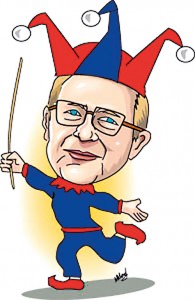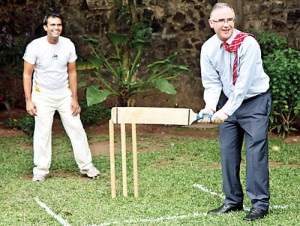After the ‘storm’ there was a lot to smile about
View(s):As British High Commissioner John Rankin looks forward to climbing Adam’s Peak before leaving our shores, he shares with Smriti Daniel some of the ups and downs of his
four-year stint here
In May 2012, John Rankin, the UK’s High Commissioner in Sri Lanka, found himself caught in a storm of controversy in the wake of a video posted on the High Commission’s website. In it, the Scottish diplomat called for steps to be taken toward demilitarisation of Sri Lanka’s northern and eastern provinces. A slew of editorials, and even a few cartoons (he still remembers one that appeared in the Sunday Times) followed. He describes it now, with masterful British understatement, as “a most memorable period.”

John Rankin. Pic by Indika Handuwala
“I did not say there should be no military presence in the north of the country,” he explains, clarifying that the comment was in the context of perceived high levels of military engagement in civilian activities, as well as the heavy presence at events where there did not appear to be a legitimate security threat. Despite immense pressure resulting from what he characterises as “a mistaken if not deliberate misrepresentation,” Rankin chose not to retract his statement, opting instead “to wait till the furore died down,” which it did eventually.
In his final newspaper interview before he leaves for a new posting, Rankin sat down with the Sunday Times to talk about that episode and others across his four years in Sri Lanka. As he finds a place on a sofa, he pre-empts my final question by revealing that on his last Sunday here, he intends to greet the sunrise from the top of Adam’s Peak. “I hope my knees will stand up to it,” he confesses. The Scotsman also loves the tea country for the echoes of home he finds there and is an outspoken admirer of the island’s natural beauty and the friendliness of its people. “There have been a lot of challenges working here but it’s the personal warmth that counts for a lot.”
He’s not underestimating the former, though he takes care to emphasise there’s plenty to celebrate in Sri Lanka’s relationship with the UK. He offers as proof that over 100 European companies are operating successfully in Sri Lanka, educational ties ensure there are some 6,000 young Sri Lankans studying in British universities at any time and that local garment manufacturers remain the suppliers of choice for big brands like Marks & Spencer that have come to rely on Sri Lanka’s quality and good labour practices.
In addition, tourists from the UK continue to pour their pounds into the country, while by 2016 the 27 UK universities that offer access to their courses via local education providers in Sri Lanka will have competition in the form of new, ‘direct campuses’ in South Asia which will function without any intermediaries.
Yet, these examples do not represent the sum of the UK’s relationship with Sri Lanka. Over his tenure as High Commissioner, Rankin has spoken of his government’s position that the end of the LTTE was welcome, as was the subsequent economic development taking place in the North and East. Alongside this though was a focus on pushing Sri Lanka’s government to “act on its own undertakings” and create accountability for human rights violators while actively promoting meaningful reconciliation amongst the country’s divided ethnic groups.

The Sunday Times cartoon on Rankin’s demilitarisation statement
Political pressure from within its borders meant that the UK could not claim to be a disinterested party, but Rankin says his government’s focus was on supporting long term solutions, and that addressing the underlying causes of the conflict was the only way to prevent it recurring in some form. The UK’s decision to sponsor a resolution seeking an international inquiry by the UN Human Rights Commission (UNHRC) into violations committed in the wartime – and most recently to accept a postponement in the publication of the UNHRC report have marked the shifting tide in their relationship with this country’s governments.
The controversial edition of the last Commonwealth Heads of Government Meeting (CHOGM), most memorable in this context for UK Prime Minister David Cameron’s visit to Jaffna, also brought Prince Charles and the Duchess of Cornwall to Sri Lanka’s shores. Mixed in with Cameron’s criticism was acknowledgment of Sri Lanka’s post-war potential but it was the royal visitors whose presence proved the most reassuring. They were greeted with such warmth, that Rankin was certain whatever the vicissitudes of the relationship between the two countries, there remains a deep bond.
He is hopeful now that the recent regime change heralds an era of more accountability and progress in Sri Lanka. Acknowledging questions of the Commonwealth’s lack of political clout in terms of sanctions or military power, he nevertheless hopes that its brand of gentle diplomacy has a place – particularly with Sri Lankan President Maithripala Sirisena holding the title of the Commonwealth Chair-in-Office.
Among the projects he remains particularly proud of are UK government initiatives such as the demining projects that have, at the last count, funnelled some £ 5.2 million into making old warzones safe once again for civilian use; successful initiatives built around community policing, language training and the hiring of women officers in local police stations; campaigns dedicated to addressing gender based violence and the work of the Sri Lanka Unites group which brings together young people from across the island to stand for reconciliation and peace.
In a speech delivered last week, titled ‘Sri Lanka – The Way Ahead’ Rankin returned to the ally his government sees in Sri Lanka, highlighting the benefits of a strong democracy and peace, as well as the need for transparent, sound economic policies. If corruption and bribery can be tackled effectively, Rankin foresees UK companies that have so far been on the fence rushing to invest in Sri Lanka. With the country’s high literacy rates and thirst for education, he believes it could easily become an academic hub for the region.
While much of interest has happened in Sri Lanka, Rankin departs with his other charge, the Maldives, in turmoil in the wake of a court ruling

Enjoying the cricket here: Rankin at the crease
that sentenced former president Mohamed Nasheed to 13 years in jail after being found guilty of terrorism. “We’re very concerned,” he tells the Sunday Times, adding, “President Nasheed’s trial has raised questions of whether due process was respected.” The hope of his government is that in the event of appeal, international observers will be able to attend proceedings, that the personal security of the prisoner will be guaranteed and that the democratic space for all parties to exercise their rights will be restored in the Maldives.
However, soon enough, events unfolding in the Maldives will be the concern of his successor. To him now is the task of saying goodbye to dear friends and colleagues. Upon his return to London he expects a new posting that may actually bring him back into Sri Lanka’s general vicinity. More he will not say except that the country will linger in his memories – the view from the lighthouse at Dondra Head, a friend’s lessons in mindfulness and even his introduction to a culture crazy about cricket. “I’ve hugely enjoyed watching cricket matches here,” he says, “when the Premadasa stadium has 35,000 people in it, the atmosphere is electric.”


